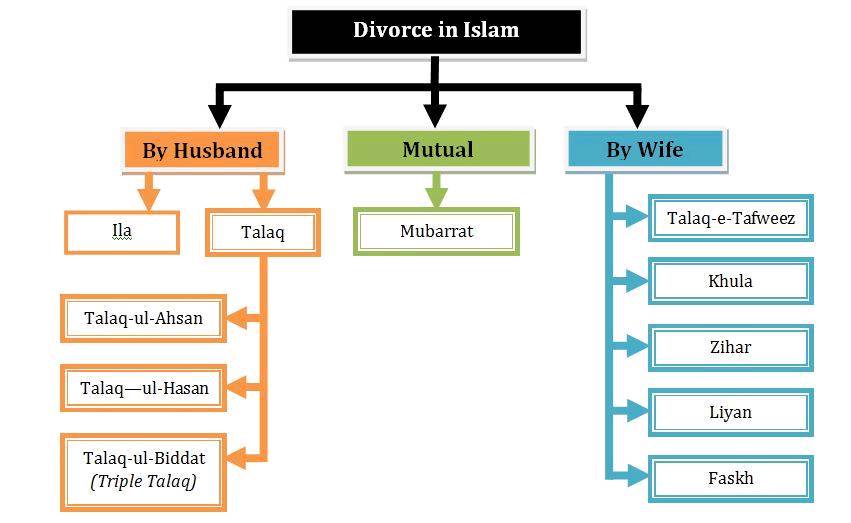Let’s talk about the different types of Talaq in Islam – By Husband (Talaq, Ila), by Mutual Consent (Mubarrat) and by Wife (Liyan, Faskh, Zihar, Khula and Talaq-e-tafweez).
1. Talaq in Islam: 3 Types –
Talaq-e-Ahsan: The husband gives talaq to wife (in a single sentence) in state of purity (tuhr) and waits for period of iddat. This type of talaq is revocable during the period of iddat. After iddat, it becomes irrevocable.
Talaq-e-Hassan: There must be 3 successive pronouncements of talaq, BUT three pronouncements are to be made in 3 successive tuhrs (in case of menstruating women) OR consecutive intervals of 30 days (in case of non-menstruating women). It can be revoked anytime before the third pronouncement. After third pronouncement, it becomes irrevocable.
Talaq-e-biddat: Triple Talaq. Bidat word stands for innovation, and therefore this type of talaq is not purely Islamic. It was innovated later (during the Umayyads) to suit patriarchy.
Here 3 pronouncements can be made during a single tuhr. (Instant Talaq), i.e. by saying “I divorce thee” thrice at the same instant. It becomes irrevocable immediately when it is pronounced irrespective of iddat. In this they cannot remarry without the formality of the woman marrying another man and being divorced from him. This is called Halalah. Pre-planned Halalah is considered a sin
-
Ila:
Where the husband is of sound mind and of the age of majority, swears by God that he will not have sexual intercourse with his wife and leaves the wife to observe iddat. He must abstain from sexual intercourse with his wife for four months or more after taking the vow.
It can be canceled by – resuming sexual intercourse within the period of four months or by a verbal retraction. It is not in practice in India.
-
Liyan: False charge of adultery –
When the husband charges the wife with adultery or denies the paternity of her child, and the charge is false, the wife is entitled to sue for and obtain divorce.
Also Read: Surviving Infidelity: How Can I Trust My Husband After He Cheated On Me?
-
Faskh:
When the wife applies for divorce in Muslim court. She is required to prove that her husband has not behaved reasonably and has not fulfilled his obligations to her as a husband. In this type of divorce the husband and wife, with mutual consent, can re-unite within the period of iddah. The outstanding Mehr must be paid to the wife.
-
Zihar: Injurious Assimilation
If a husband compares the wife with his mother or any other female relative within prohibited degree, the wife has a right to refuse herself to him (or have sexual intercourse with him) until he has performed a penance such as freeing a slave or fasting for a month. In default of expiation by penance, the wife has the right to apply for judicial divorce.
-
Mubarrat: Divorce by mutual agreement.
Either husband or wife can make the offer.
Also Read: Uniform Civil Code Is Taking Away Privileges of Muslims? Really?
-
Khula:
When divorce is initiated by wife. In this she is at liberty to keep or return the Mehr (dower) she received from her husband at the time of her marriage.
-
Talaq-e-tafweez:
A wife does not divorce her husband but gets herself divorced (at her behest) from the husband.
This post on Talaq in Islam was first published by Farhan Rahman on his facebook timeline.



